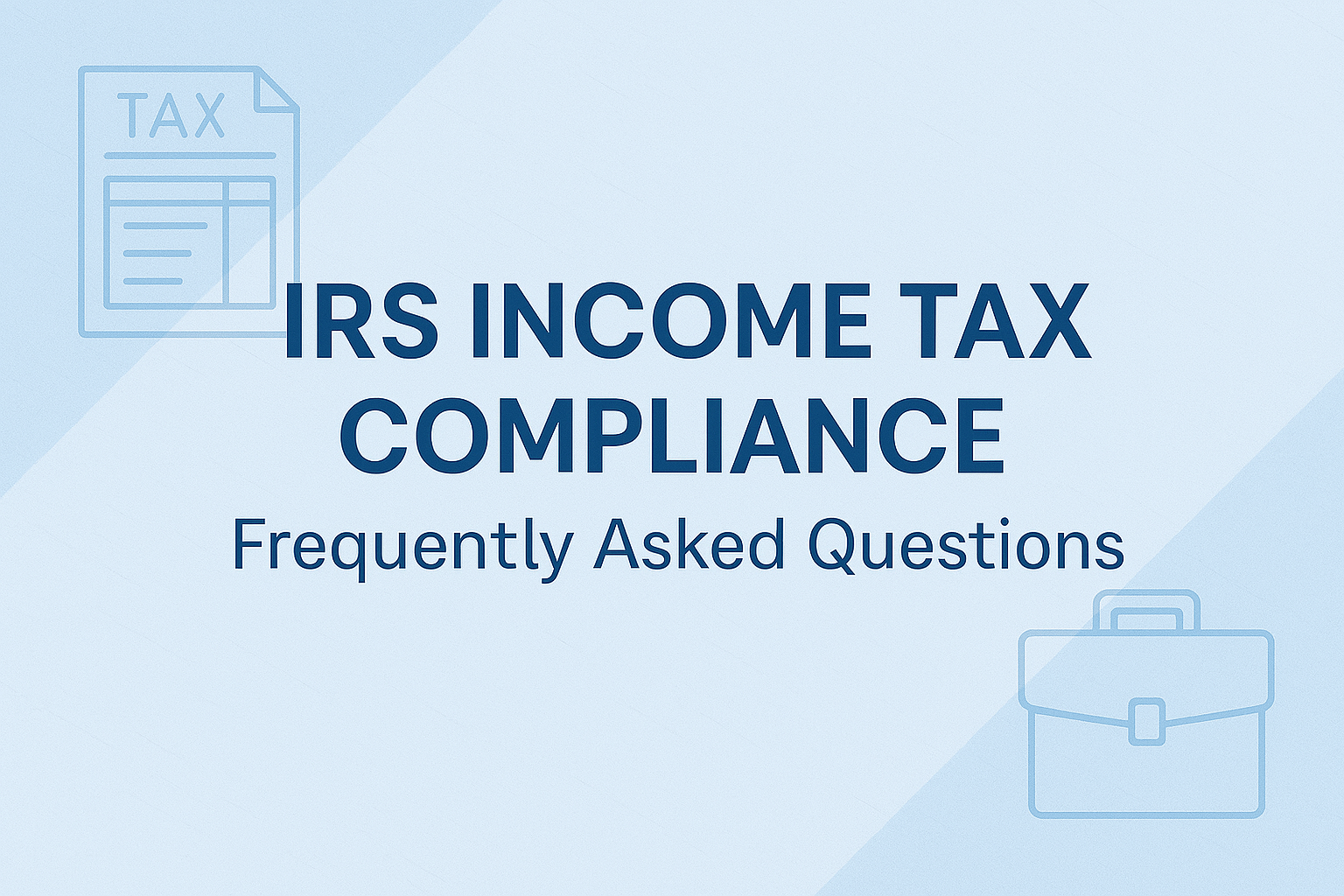IRS Income Tax Compliance: Frequently Asked Questions

1. How many years of unfiled returns must I file to be in compliance?
Typically, the IRS wants you to file your last six unfiled returns.
2. What are the filing deadlines for federal returns?
For calendar-year filers:
- Form 1065 (Partnerships): Due March 15 (Extension to September 15)
- Form 1120S (S Corporations): Due March 15 (Extension to September 15)
- Form 1040 (Individuals): Due April 15 (Extension to October 15)
- Form 1120 (C Corporations): Due April 15 (Extension to October 15)
For fiscal-year filers, deadlines typically fall on the 15th day of the 3rd or 4th month after your year-end, plus an optional 6-month extension.
3. Can I still file a late tax return?
Yes. The IRS accepts late returns, but penalties and interest may accrue. It’s generally better to file late voluntarily before an IRS notice arrives.
4. Can I file multiple late returns online?
You can generally e-file up to 3 prior years. Any older returns must be mailed in. We can guide you on the correct method for each late return.
5. Do you also file state income tax returns?
Yes. We prepare federal and state returns, even if the state has separate or additional requirements. We’ll confirm any applicable state filings during onboarding.
6. What if I don’t have my W-2, Schedule K-1, or other forms from past years?
With Form 8821 or Form 2848 in place, we can request an IRS Wage and Income Transcript to reconstruct your missing information.
7. What if I lack financial records to file old business returns (1065, 1120, 1120S)?
We can help reconstruct your financial records using bank statements, prior filings, and IRS transcripts. This process may require in-depth accounting, depending on data availability.
8. What if the IRS filed a Substitute for Return (SFR) on my behalf?
You can typically file your own original return to replace the SFR assessment. The IRS will then recalculate your tax based on the new information you submit.
9. When should I amend a previously filed individual or business return?
- Individual (Form 1040): Use Form 1040-X to correct any missed income, deductions, or filing status errors.
- Partnership (Form 1065), S Corp (Form 1120S), C Corp (Form 1120): File an amended return if you find inaccuracies in reported income, allocations, or deductions.
Generally, you have 3 years from the original due date (or 2 years from the date you paid the tax, if later) to amend a return.
10. How long does the IRS have to assess additional tax on my filed return?
Under the Assessment Statute Expiration Date (ASED), the IRS has three years from the date you file your return or the return’s due date — whichever is later — to assess additional tax. Certain exceptions apply, such as cases involving fraud, failure to file, or substantial underreporting of income, which can extend or remove the standard three-year period.
11. Where do I pay my IRS tax due online?
- Individuals: You can pay online through your IRS account or as a guest.
- Businesses: Can use the Electronic Federal Tax Payment System (EFTPS) to schedule secure tax payments or the Business Tax Account.
12. Where do I go to create an IRS personal or business account?
- Individuals: Create or access IRS Individual Online Account
- Businesses: Visit the IRS business account services page.
You’ll need to verify your identity and follow the on-screen instructions to set up secure login credentials.
13. How do I check my IRS refund status?
Use the Where’s My Refund? tool. You’ll need your SSN/ITIN, filing status, and exact refund amount.
14. What is the statute of limitations for an IRS refund?
You have 3 years from the original filing deadline (or 2 years from the date you paid the tax) to claim a refund. After that, the IRS generally will not issue the funds. This is known as the Refund Statute Expiration Date (RSED).
15. What is the statute of limitations for IRS collections?
The IRS has 10 years from the date of assessment to collect a balance due, known as the Collection Statute Expiration Date (CSED).
16. Can I request transcripts from the IRS to confirm my filing history?
Yes. With your authorization (Form 8821 or 2848), we can obtain IRS account transcripts, wage and income transcripts, and more to confirm what’s on file.
17. What if I suspect a tax issue but haven’t received a notice?
You may have unnoticed liabilities or mismatches. A tax account review can detect potential problems, letting you correct them before they escalate.
Stay Compliant and Confident!
Need help with IRS Audits or collection issues?
Visit our IRS Tax Resolution: Frequently Asked Questions to see how we can negotiate and settle your tax liabilities.

